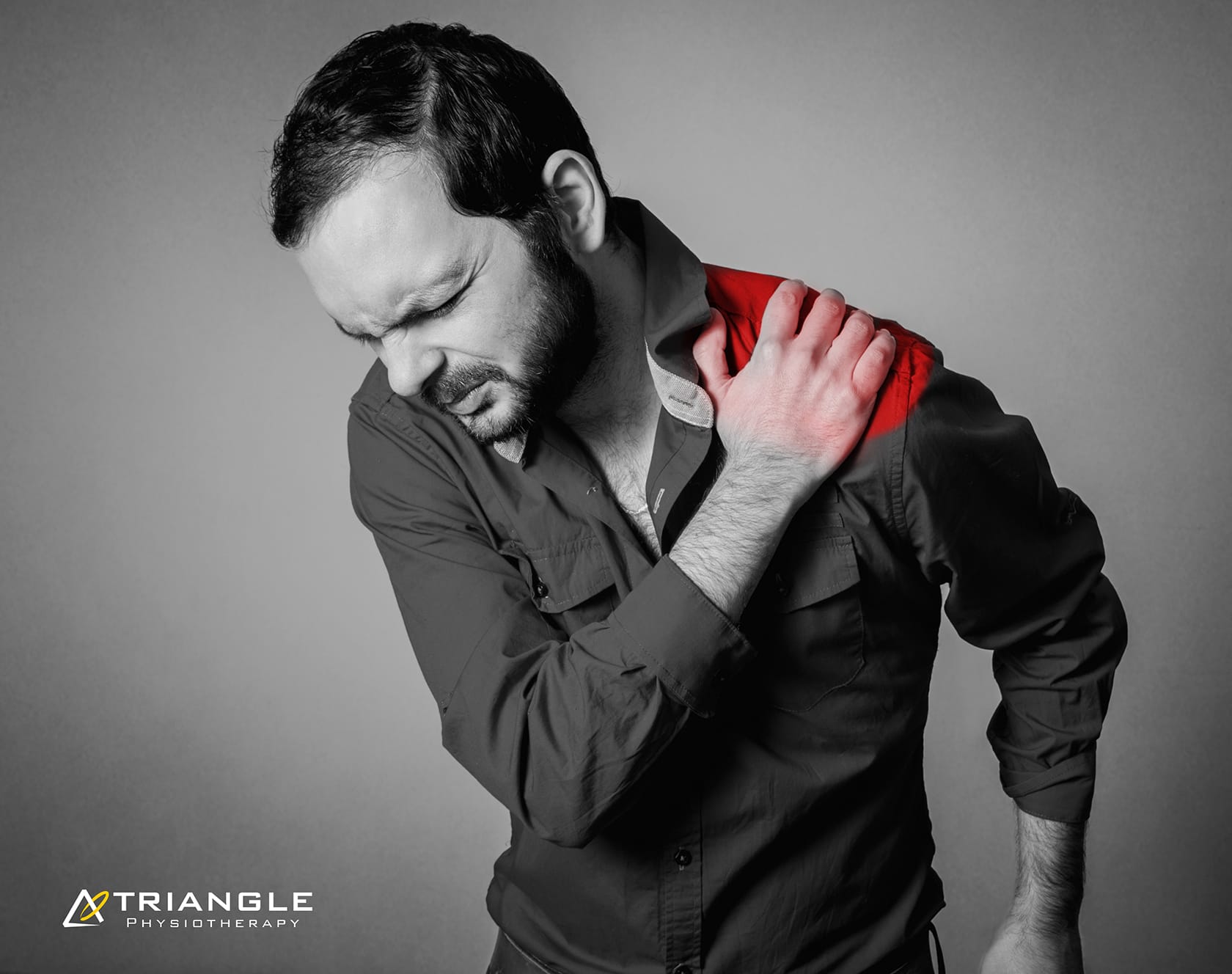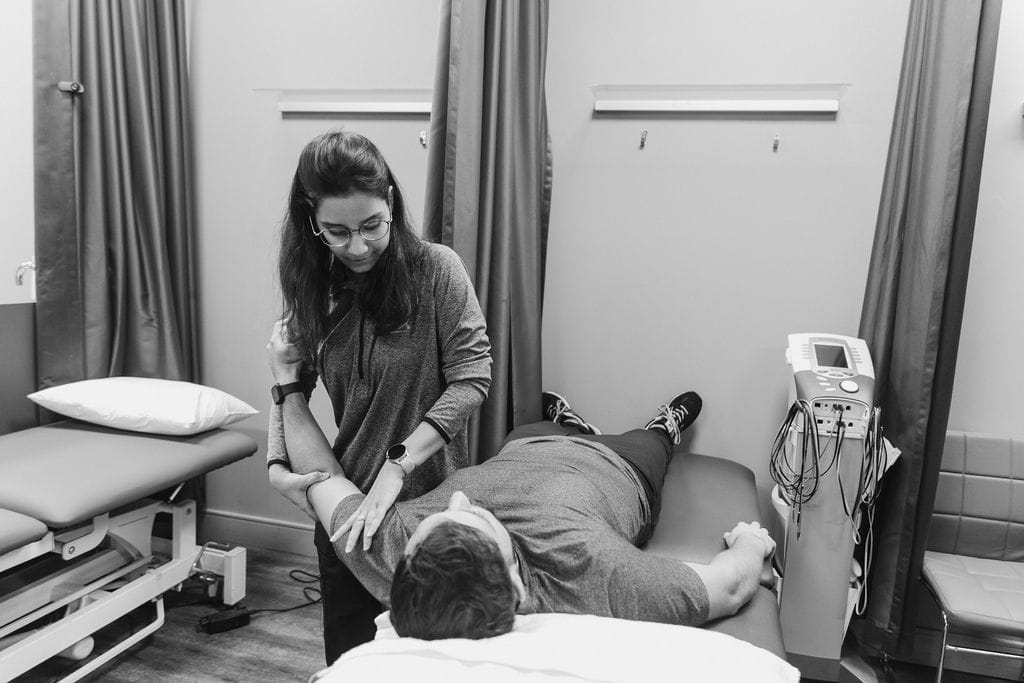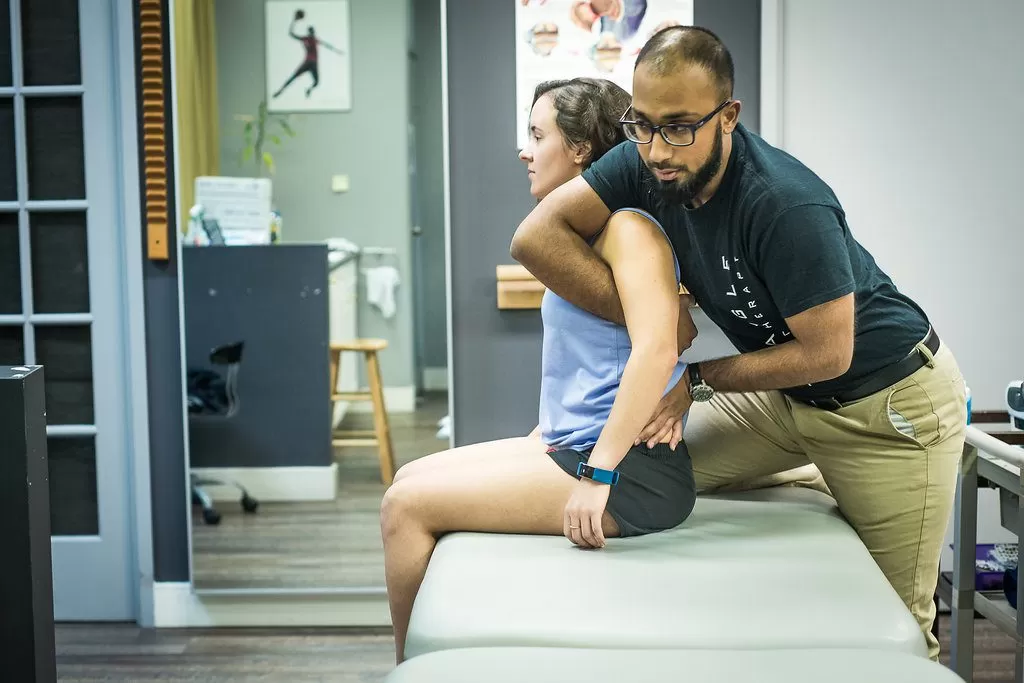Clavicular fractures, commonly known as broken collarbones, are prevalent injuries, especially among athletes and those engaged in physical activities. This type of fracture typically occurs due to falls, direct trauma to collarbone or shoulder, or collisions. Understanding the clavicular fractures in detail, their recovery process, and preventive measures can help individuals better manage their healing journey and minimize the risk of future injuries.
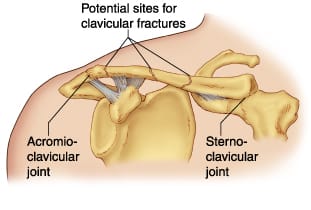
Schedule an appointment with one of the physiotherapists at one of the 8 locations of Triangle Physiotherapy if you have had a clavicular fracture and are looking to achieve optimal recovery.
What is the recovery timeline for clavicular fractures?
The recovery timeline for a clavicular fracture can vary based on the severity of the break and the individual’s overall health. Generally, non-displaced fractures may heal within 6 to 12 weeks with conservative treatment, including rest, immobilization, and pain management. In more severe cases, surgical intervention may be necessary, leading to a slightly extended recovery period. During this time, it’s essential to follow medical advice and engage in a structured rehabilitation program under the supervision of a Physiotherapist to restore strength and function to the shoulder.
What type of exercises are beneficial in the rehabilitation Clavicular Fractures?
Neuromuscular Exercises
Neuromuscular exercises play a crucial role in the rehabilitation process. These exercises focus on improving coordination and communication between the nervous system and muscles, which is vital for shoulder recovery. Some forms of improving the neuro-muscle link could be gentle isometric contractions of the shoulder muscles without joint movement, activating the shoulder blade muscles. As healing progresses, activities that involve controlled movements can help enhance muscle activation and prevent stiffness, promoting a smoother transition to more strenuous exercises.
Mobility Incorporation
Incorporating mobility exercises into the rehabilitation program is essential for restoring range of motion in the shoulder. Gentle stretching and mobility drills should begin as soon as cleared by a healthcare professional. Physiotherapist would be the perfect healthcare practitioner that can guide you in terms of muscle activation and rehabilitation. Common exercises include pendulum swings and passive arm movements. These activities not only help to alleviate stiffness but also prepare the shoulder for more demanding functional tasks. Regularly practicing mobility exercises ensures that the joint remains flexible and reduces the risk of future injuries.
Progressive Resistance Exercises
Once the shoulder has regained sufficient mobility and strength, progressive resistance exercises can be introduced. These exercises aim to gradually increase the load on the muscles surrounding the shoulder joint, facilitating strength development and functional recovery. Starting with lightweight resistance bands or dumbbells, individuals can perform exercises focusing on rotator cuff, shoulder stabilizers as well as the scapular muscles. The key is to focus on form and gradually increase resistance as strength improves, avoiding any pain or discomfort.
How can clavicular fractures be prevented?
Preventing clavicular fractures involves a combination of strength training, proper technique, and awareness of one’s surroundings. In order to prevent clavicular fractures, one needs a multidisciplinary approach under the supervision of a Physiotherapist, Chiropractor and a Massage Therapist. Engaging in shoulder-strengthening exercises can improve stability and reduce the likelihood of injuries. Athletes should prioritize learning proper falling techniques to minimize impact during falls or collisions. Additionally, wearing protective gear in high-risk sports can provide an extra layer of safety. Overall, being proactive about shoulder health can significantly decrease the chances of experiencing a clavicular fracture.
Other FAQ’s
FAQs
Q: How can I tell if I have a clavicular fracture?
A: Symptoms may include sharp pain at the site of the injury, swelling, bruising, and difficulty moving the shoulder. A visible deformity or “bump” over the collarbone may also indicate a fracture.
Q: Do all clavicular fractures require surgery?
A: No, not all fractures require surgery. Non-displaced fractures are often treated conservatively, while displaced fractures or those involving significant displacement may necessitate surgical intervention.
Q: How long will it take to return to normal activities?
A: Recovery times vary but typically range from 6 to 12 weeks for non-displaced fractures. Full recovery and return to sports may take longer, depending on the nature of the fracture and rehabilitation progress.
Q: Are there any long-term effects of a clavicular fracture?
A: Most individuals recover fully without long-term complications. However, some may experience residual pain or reduced strength in the shoulder. Engaging in a comprehensive rehabilitation program can help mitigate these risks.
Q: What should I do if I suspect a clavicular fracture?
A: Seek medical attention immediately. A healthcare professional can provide an accurate diagnosis and develop a treatment plan tailored to your needs. By understanding clavicular fractures and their recovery process, individuals can better navigate their healing journey and take proactive steps to prevent future injuries. Always consult with healthcare professionals to ensure the best outcomes during recovery and rehabilitation.
If you would like to start you post-fracture rehab at Triangle Physiotherapy, contact us today to schedule a physiotherapy appointment.
Shoulder pain is a common issue that can affect anyone, whether you’re an athlete, a desk worker, or someone engaging in daily activities. Understanding the causes, prevention strategies, and effective treatments can help you manage this discomfort and improve your quality of life.
Thankfully, the physiotherapists and chiropractors at Triangle Physiotherapy are well-versed in diagnosing and treating shoulder conditions and also making sure you know what to do to prevent future recurrences.
Lets dive into a detailed look into shoulder pain!
Understanding Shoulder Pain
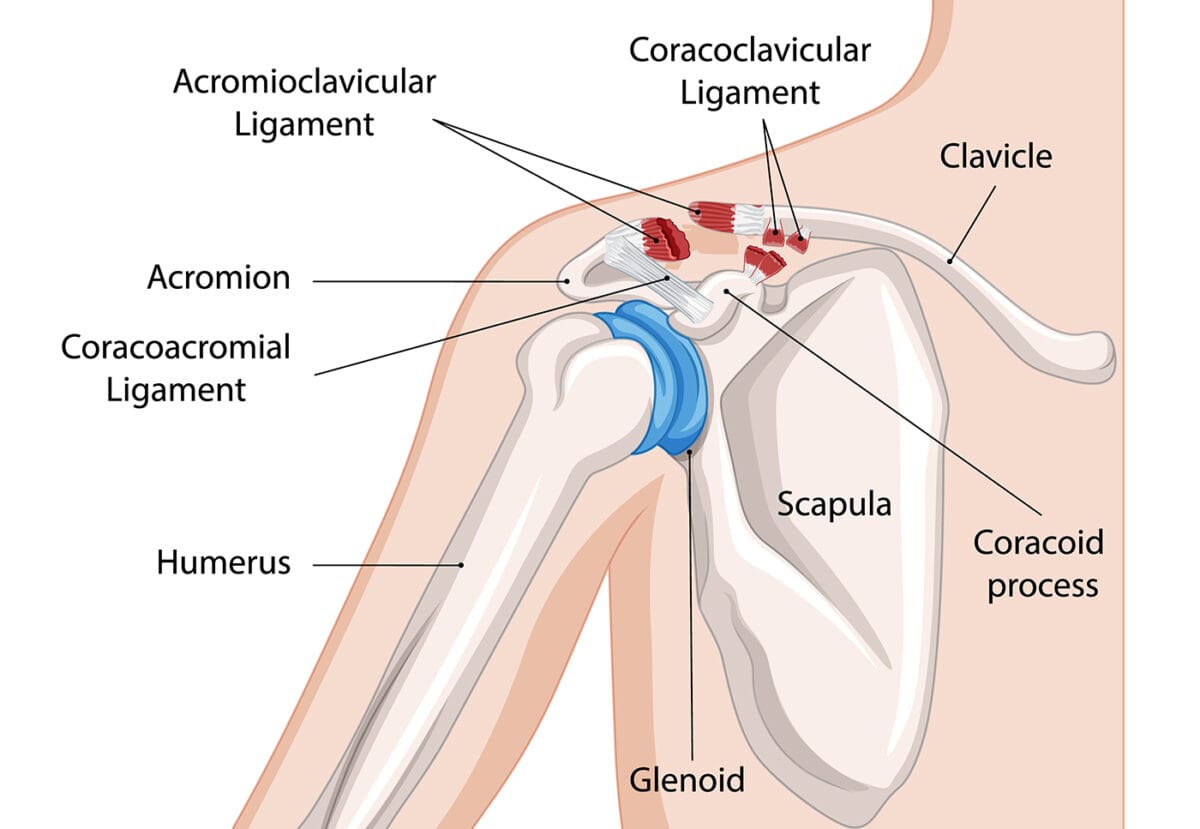
Shoulder pain can arise from a variety of sources, including injuries, overuse, and underlying medical conditions. Common causes include rotator cuff injuries, tendonitis, bursitis, arthritis, and referred pain from the neck or back. The shoulder is a complex joint with a wide range of motion, making it susceptible to strain and injury.
Prevention
Preventing shoulder pain involves proactive measures to protect your joints and maintain strength and flexibility. Here are some key strategies:
- Proper Posture: Maintain good posture while sitting and standing to reduce strain on your shoulders. Be mindful of your alignment, especially when using computers or mobile devices.
- Strength Training: Regularly engage in strength training exercises to support shoulder stability. Focus on the rotator cuff and shoulder blade muscles.
- Warm-Up Before Activity: Always warm up before engaging in sports or physical activities to prepare your muscles and joints.
Importance of Physiotherapy for Shoulder Pain
Physiotherapy is essential in diagnosing and treating shoulder pain. A physiotherapist can create a personalized treatment plan that includes exercises to strengthen the shoulder muscles, improve flexibility, and promote healing. They can also provide manual therapy and modalities like ultrasound or electrical stimulation to alleviate pain. Early intervention can prevent chronic issues and aid recovery.
Neuromuscular Exercises for Pain
Neuromuscular exercises focus on improving coordination and strength, which are crucial for shoulder health. Effective neuromuscular exercises for shoulder pain include:
- External Rotations: This exercise targets the rotator cuff, enhancing stability.
- Scapular Retractions: Strengthens the muscles around the shoulder blades, promoting better posture.
- Wall Angels: Improves shoulder mobility and encourages proper movement patterns.
Progressive Resistance Training
Incorporating progressive resistance training into your fitness routine can greatly benefit shoulder health. Gradually increasing the weights you lift helps build strength and endurance in the shoulder muscles. Focus on compound movements like overhead presses and rows, ensuring you maintain proper form to avoid further injury.
Incorporating Mobility into Your Daily Routine
Mobility exercises enhance flexibility and range of motion, crucial for preventing shoulder pain. Simple stretches like doorway stretches, cross-body arm stretches, and shoulder rolls can make a significant difference. Incorporate these stretches into your daily routine, perhaps during breaks or before bed, to keep your shoulders flexible and reduce tightness.
Tips for Safely Performing Exercises
Safety should always be your priority when exercising, especially if you’re dealing with shoulder pain. Here are some tips to keep in mind:
- Warm-Up: Always begin with a gentle warm-up to prepare your muscles.
- Listen to Your Body: If any movement causes pain, stop immediately and reassess.
- Use Proper Technique: Focus on form rather than weight to prevent injuries.
Consult Professionals: Work with a physiotherapist if you’re unsure about your exercises or recovering from an injury.
Shoulder pain can be a frustrating condition, but understanding its causes and implementing preventive measures can lead to relief. Always prioritize safety and seek professional guidance when needed. With the right approach, you can manage and reduce shoulder pain, allowing you to return to your favorite activities and enjoy a healthier lifestyle.
We understand that life can get busy but don’t forget to prioritize your health. Book an appointment to get that shoulder checked out at any one of our 8 locations.
Sources:
https://www.physio-pedia.com/Evidence_Based_Interventions_for_Shoulder_Pain
Rotator cuff tears can be a challenging injuries, impacting your ability to perform everyday tasks and participate in activities you enjoy. The rotator cuff, a group of four muscles and their tendons located in the shoulder, is crucial for shoulder stability and movement. Physiotherapy plays a vital role in the recovery process, helping to alleviate pain, restore function, and prevent future injuries. In this guide, we’ll explore how physiotherapists can assist with a rotator cuff tear, including causes, prevention strategies, and various physiotherapy techniques.
Our physiotherapists in Toronto can help you with rotator cuff injuries and rehabilitation.
Causes of Rotator Cuff Tears
What It Is: The rotator cuff consists of four muscles—supraspinatus, infraspinatus, teres minor, and subscapularis (SITS) —that stabilize and move the shoulder joint. A tear in one or more of these tendons can disrupt shoulder function.
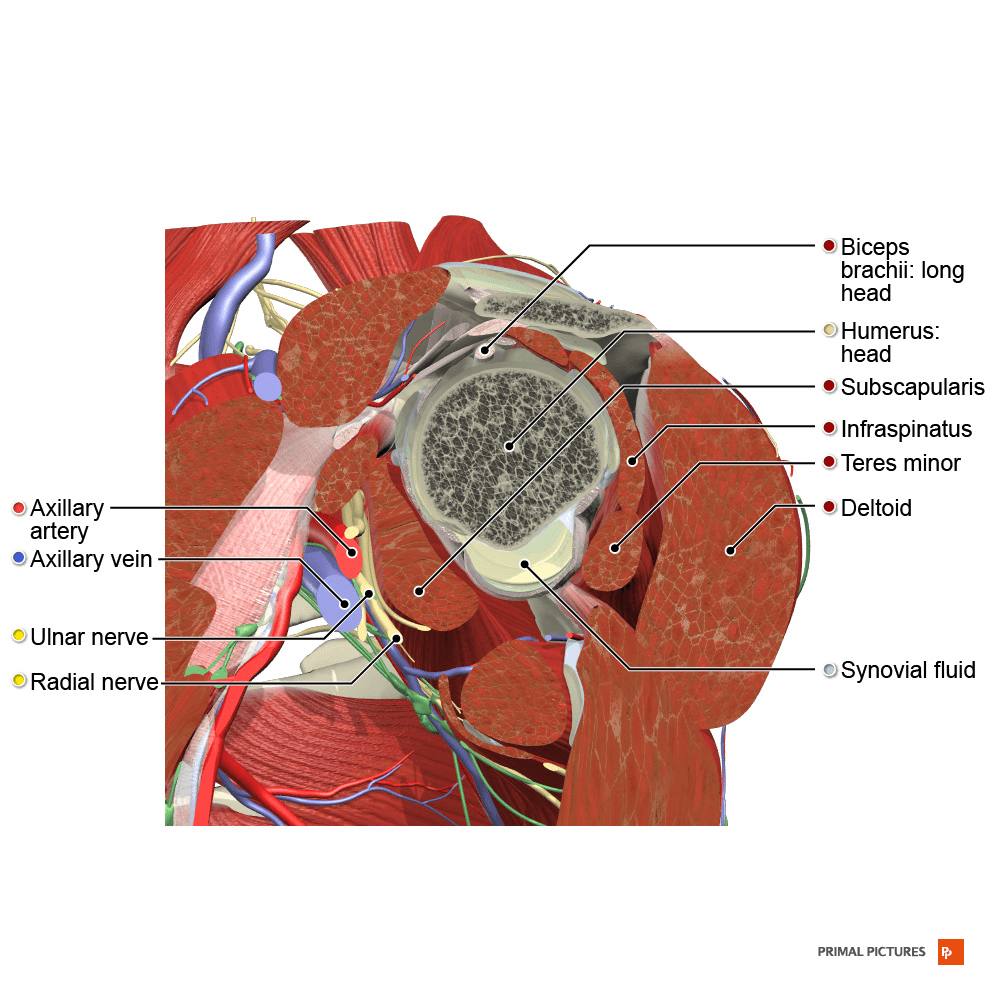
Common Causes:
- Overuse: Repetitive overhead motions, such as those performed in sports like baseball or tennis, can lead to gradual wear and tear.
- Acute Injury: A sudden fall or lifting a heavy object can cause an acute rotator cuff tear.
- Aging: As we age, the tendons can weaken and become more prone to tears due to decreased blood supply and collagen degeneration.
Prevention Strategies
How to Reduce Risk: Although some rotator cuff tears are unavoidable, implementing preventive measures can help minimize the risk.
- Strength Training: Strengthen the muscles around the shoulder, including the rotator cuff muscles, to support the joint and prevent strain.
- Proper Technique: Use correct form when performing overhead activities or lifting weights to reduce undue stress on the shoulder.
- Regular Stretching: Maintain flexibility in the shoulder and adjacent joints to prevent stiffness and improve the range of motion. For example, one tends to have tight chest muscles and weak back muscles, hence the shoulder overcompensates.
Resistance Exercises
Purpose: Resistance exercises help build strength in the rotator cuff and surrounding muscles, which is crucial for stabilizing the shoulder joint and aiding recovery.
Examples:
- External Rotations: Use a resistance band or light dumbbell to perform external rotation exercises, targeting the infraspinatus and teres minor.
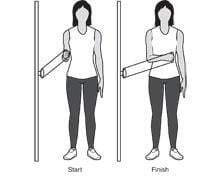
- Internal Rotations: Perform internal rotation exercises with a band or dumbbell to strengthen the subscapularis muscle.
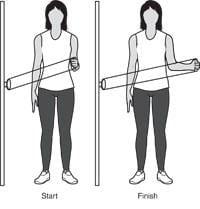
- Scapular Retractions: Strengthen the muscles between the shoulder blades to support overall shoulder function.
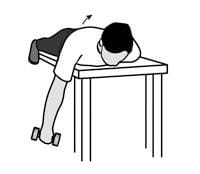
How to Do Them Safely: Start with low resistance and increase gradually as your strength improves. Focus on controlled movements to avoid further strain on the shoulder.
Neuromuscular Exercises
Purpose: Neuromuscular exercises enhance coordination and the communication between your brain and muscles, improving shoulder stability and function.
Examples:
- Shoulder Blade Squeezes: Squeeze your shoulder blades together to activate the muscles that stabilize the shoulder.
- Proprioceptive Training: Use a stability ball or balance board to improve proprioception and shoulder stability.
- Dynamic Movements: Incorporate exercises that involve dynamic shoulder movements to enhance neuromuscular control.
How to Do Them Safely: Start with basic exercises and progress to more challenging ones as your coordination and stability improve.
Progressive Exercises
Purpose: Progressive exercises are designed to gradually increase in difficulty, helping to build strength and endurance while avoiding overexertion.
Examples:
- Shoulder Press: Begin with light weights and gradually increase the load as your shoulder strength improves.
- Front Raises: Use light dumbbells to perform front raises, increasing the weight progressively.
- Side-Lying Abduction: Lift your arm while lying on your side to strengthen the shoulder muscles, starting with lighter resistance and increasing as tolerated.
How to Do Them Safely: Follow a structured program that gradually increases the intensity and complexity of exercises to prevent overuse injuries.
Stretching and Strengthening
Purpose: Stretching maintains flexibility and reduces stiffness, while strengthening exercises build muscle support necessary for shoulder stability.
Examples:
- Pendulum Exercises: Allow your arm to swing gently in circles to improve flexibility and reduce stiffness.
- Cross-Body Stretch: Stretch the shoulder by bringing one arm across your body and holding it with the opposite arm.
- Strengthening Exercises: Perform exercises like resisted shoulder external and internal rotations to build rotator cuff strength.
How to Do Them Safely: Stretch slowly and hold each stretch for 15-30 seconds. Ensure strengthening exercises are done with proper form and controlled movements.
Mobility Routine
Purpose: A mobility routine focuses on improving the range of motion and overall function of the shoulder joint.
Examples:
- Shoulder Circles: Perform gentle shoulder circles to increase flexibility and mobility.
- Wall Angels: Stand with your back against a wall and slowly move your arms up and down to improve shoulder movement.
- Towel Stretch: Hold a towel behind your back with both hands and gently pull to stretch the shoulder.
How to Do Them Safely: Perform exercises within a comfortable range of motion and avoid pushing through pain.
Tips for Safely Performing Activities
How to Stay Safe: As you recover and resume activities, following these tips can help prevent re-injury and ensure a safe return to your routine.
- Listen to Your Body: Pay attention to any pain or discomfort and modify your activities as needed.
- Gradual Return: Ease back into your regular activities and sports gradually to allow your shoulder to adjust.
- Use Proper Technique: Ensure you use correct techniques for overhead movements and lifting to prevent undue stress on your shoulder.
Seek Professional Guidance: Work with a physiotherapist to develop a personalized rehabilitation program and get advice on technique and progression.
Recovering from a rotator cuff tear involves a comprehensive approach that includes strength building, flexibility exercises, and proper mobility routines. By incorporating resistance and neuromuscular exercises, following a progressive exercise routine, and paying attention to your body’s signals, you can enhance your recovery and reduce the risk of future injuries. Remember, patience and consistency are key in your rehabilitation journey. With the right physiotherapy and preventive measures, you’ll be back to your favorite activities stronger and more resilient.Don’t let these physical conditions ever ride on you.
Click here to book an appointment with a physiotherapist in Toronto.
A rotator cuff tears are common injuries to the shoulder, involving a tear in one or more of the tendons of the rotator cuff muscles. It is one of the leading causes of shoulder pain and disability. The rotator cuff is a group of four muscles and their tendons that stabilize the shoulder and allow for its wide range of motion.
Understanding Rotator Cuff Tears: Causes and Symptoms
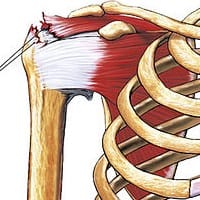
The rotator cuff is a group of four muscles and their tendons that stabilize the shoulder and allow for its wide range of motion. These muscles are:
- Supraspinatus
- Infraspinatus
- Teres minor
- Subscapularis
Types of Rotator Cuff Tears
- Partial Tear: This type of tear damages the tendon but does not completely sever it.
- Complete Tear: Also known as a full-thickness tear, this type involves the tendon being split into two pieces or pulled completely off the bone.
Causes
- Acute Injury: Sudden injuries, such as a fall on an outstretched arm or lifting something heavy with a jerking motion.
- Degenerative Wear and Tear: Gradual wear over time due to aging, repetitive stress from activities (like sports or certain jobs), or poor shoulder mechanics.
Symptoms
- Pain at rest and at night, particularly if lying on the affected shoulder
- Pain when lifting and lowering your arm or with specific movements
- Weakness in the shoulder
- Crackling sensation when moving the shoulder in certain positions
Importance of Physiotherapy in Rotator Cuff Tear Treatment
Physiotherapy plays a crucial role in the treatment and rehabilitation of rotator cuff tears. It can help in several ways, whether as a primary treatment for less severe tears or as a post-surgical rehabilitation strategy for more significant injuries. Here are some key points highlighting the importance of physiotherapy in rotator cuff tear treatment:
Pain Reduction
- Manual Therapy: Techniques such as massage and joint mobilization can help reduce pain and improve shoulder function.
- Modalities: Use of heat, ice, ultrasound, and electrical stimulation can help manage pain and inflammation.
Restoring Range of Motion
- Stretching Exercises: Specific stretches help maintain and gradually improve shoulder flexibility.
- Mobilization Techniques: Gentle mobilization can help increase the range of motion without causing further injury.
Strengthening Shoulder Muscles
- Strengthening Exercises: Focused on the rotator cuff and surrounding muscles, these exercises help restore strength and function to the shoulder.
- Progressive Resistance: Gradual increase in resistance helps to build muscle strength over time.
Improving Shoulder Stability
- Proprioceptive Training: Exercises that improve the body’s ability to sense the position and movement of the shoulder, enhancing stability.
- Functional Training: Exercises tailored to improve stability during daily activities and specific movements required in sports or work.
Enhancing Surgical Outcomes
- Pre-Surgical Physiotherapy (“Prehabilitation”): Strengthening and conditioning the shoulder before surgery can lead to better post-surgical outcomes.
- Post-Surgical Rehabilitation: Structured physiotherapy is essential to restore function, strength, and range of motion after surgery. It also helps minimize scar tissue formation and adhesions.
Preventing Further Injury
- Education: Teaching proper shoulder mechanics and ergonomic principles to avoid movements that can exacerbate the injury.
- Exercise Regimen: Developing a long-term exercise plan to maintain shoulder health and prevent future injuries.
Tailored Rehabilitation Programs
- Individualized Plans: Physiotherapists create personalized treatment plans based on the specific nature of the tear, the patient’s overall health, and their functional goals.
- Goal Setting: Setting realistic and progressive goals to keep the patient motivated and track progress.
Long-Term Shoulder Health
- Maintenance Exercises: Developing a routine of exercises to be continued even after formal physiotherapy ends to maintain shoulder health.
- Lifestyle Modifications: Advice on modifications to daily activities and sports techniques to protect the shoulder.
In summary, physiotherapy is an integral part of the comprehensive management of rotator cuff tears, offering a non-invasive approach to pain relief, functional restoration, and long-term shoulder health. It provides a structured and supportive environment for recovery, whether used alone or in conjunction with surgical treatments.
Click here to book an appointment with a physiotherapist at one of our eight locations.
- Physiotherapy Etobicoke – Triangle Physiotherapy Etobicoke
- Oakville Physiotherapy Clinic – Triangle Physiotherapy Oakville
- Physiotherapy North York – Triangle Physiotherapy North York
- Mississauga Physiotherapy Clinics – Triangle Physiotherapy Mississauga
- Downtown Physiotherapy Clinics – Triangle Physiotherapy King West
- Uptown Physiotherapy Clinics – Triangle Physiotherapy Lawrence Park
- Physiotherapy Clinic Downtown Toronto – Triangle Physiotherapy Queens Quay
- Physiotherapy Clinics Mississauga – Triangle Physiotherapy Erin Mills
“Rotator cuff tears require expert treatment and rehabilitation to restore function and reduce pain. Triangle Physiotherapy offers specialized care across the GTA. Whether you’re seeking Physiotherapy in Etobicoke, Oakville, North York, Toronto, Lawrence Park, Queens Quay, Erin Mills, Mississauga, or Liberty Village, our experienced team is here to help you on your recovery journey.”
Frozen shoulder, also known as adhesive capsulitis, is a condition characterized by stiffness and pain in the shoulder joint. It can significantly limit range of motion and impact daily activities. While it can be a challenging condition to manage, there are exercises and tips that can help provide relief and improve mobility. In this article, we’ll explore some easy exercises and practical tips for alleviating frozen shoulder symptoms.
Understanding Frozen Shoulder
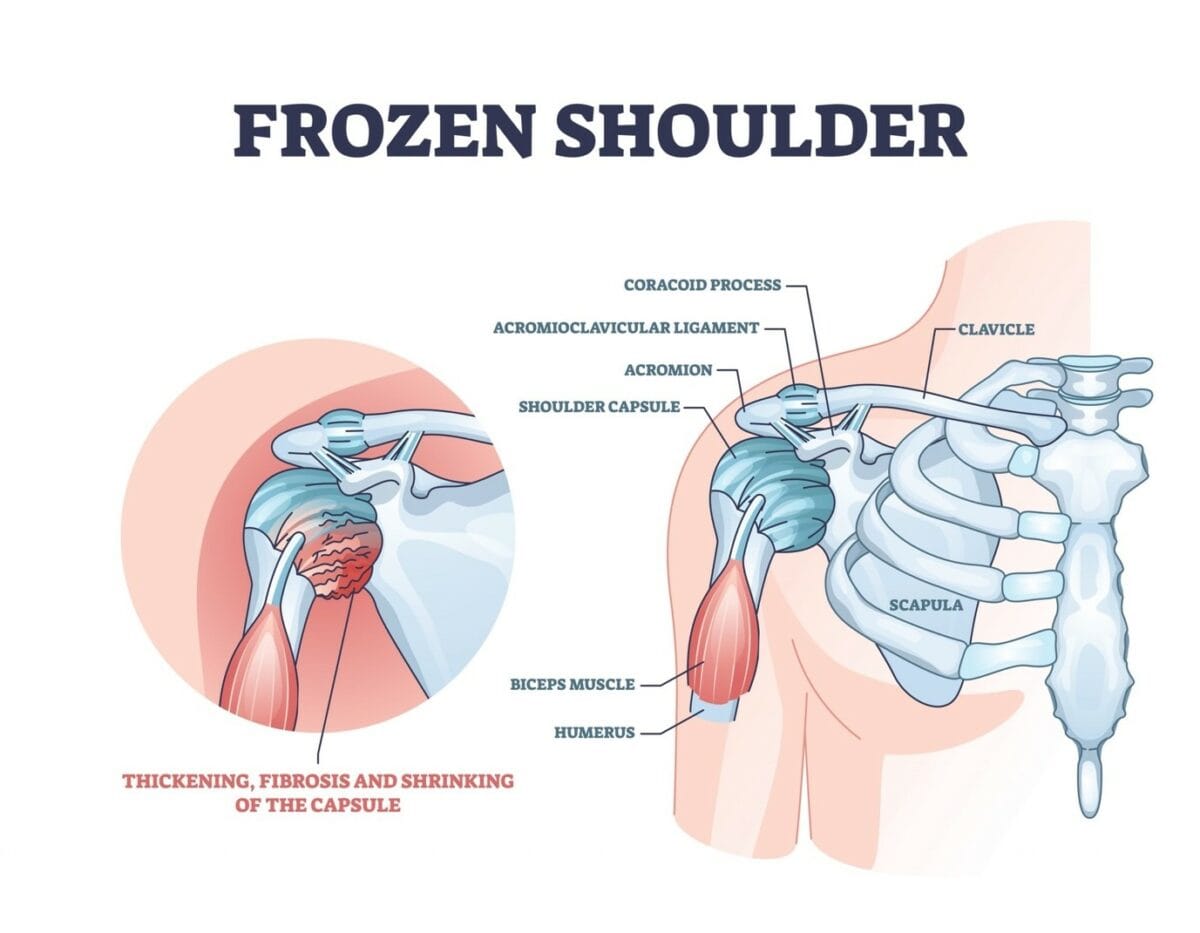
Before diving into exercises and tips, let’s briefly understand what frozen shoulder is. Frozen shoulder occurs when the connective tissue surrounding the shoulder joint becomes inflamed and thickened, leading to stiffness and reduced mobility. The exact cause is often unknown, but factors such as injury, surgery, prolonged immobility, or underlying medical conditions can contribute to its development.
Frozen shoulder typically develops gradually and progresses through three stages:
- Freezing Stage: During this initial stage, individuals experience increasing shoulder pain and stiffness. Range of motion becomes limited, making it difficult to perform daily activities such as reaching overhead or behind the back.
- Frozen Stage: In the frozen stage, shoulder stiffness and pain may plateau, but the range of motion remains significantly restricted. Activities that require lifting or rotating the arm may be particularly challenging, and pain may persist, especially at night.
- Thawing Stage: The thawing stage is characterized by a gradual improvement in shoulder mobility and a reduction in pain. Range of motion gradually returns to normal or near-normal levels over time, although this process can take several months to years.
Easy Exercises for Frozen Shoulders

Pendulum Stretch
This exercise helps loosen the shoulder joint and improve range of motion.
- Stand or sit with your unaffected arm supported on a table or chair.
- Lean forward slightly and let your affected arm hang down.
- Gently swing your arm in small circles, forward and backward, for 5-10 minutes.
- Perform 10-15 circles in each direction gradually increasing the range of motion
Towel Stretch
This stretch targets the shoulder capsule and helps improve flexibility.
- Hold a towel behind your back with one hand and grab the other end with your opposite hand.
- Gently pull the towel upward with your top hand while gently pushing downward with your bottom hand.
- Hold the stretch for 15-30 seconds, then relax.
- Repeat several times, gradually increasing the stretch as tolerated.
Wall Walk
This exercise helps stretch the shoulder muscles and increase range of motion.
- Stand facing a wall with your fingertips touching the wall at waist height.
- Slowly walk your fingers up the wall, raising your arm as high as possible without causing pain.
- Hold the stretch for a few seconds, then walk your fingers back down.
- Repeat for 5-10 repetitions, gradually increasing the height as your mobility improves.
Cross-Body Stretch
- Use your unaffected arm to gently pull the affected arm across your body.
- Hold the stretch for 15-30 seconds, feeling a gentle stretch in the shoulder.
- Repeat on the other side.
- Perform 2-3 sets on each side, alternating between arms.
Practical Tips for Managing Frozen Shoulders:
- Apply Heat: Using a heating pad or warm towel on the affected shoulder can help relax tight muscles and increase blood flow, reducing stiffness and discomfort.
- Practice Good Posture: Maintaining proper posture throughout the day can prevent further strain on the shoulders and promote better alignment and mobility.
- Avoid Overuse: Be mindful of activities that aggravate shoulder pain and limit repetitive movements or heavy lifting that could worsen symptoms.
- Stay Active: While rest is important for healing, gentle exercise and movement can help prevent stiffness and promote recovery. Incorporate low-impact activities like walking or swimming into your routine.
- Seek Professional Help: If symptoms persist or worsen despite home remedies, consider seeking guidance from a healthcare professional or a physical therapist.
While frozen shoulder can be a frustrating and painful condition, incorporating easy exercises and practical tips into your daily routine can help alleviate symptoms and improve mobility. By including gentle exercises, practicing good habits, and seeking appropriate medical care when needed, individuals with frozen shoulders can improve mobility, reduce pain, and regain function in their shoulders.
However one should Remember to start slowly and gradually increase the intensity of exercises as tolerated. If symptoms persist or worsen, one should consult a physiotherapist for further evaluation and treatment options. With patience and consistent effort, relief from frozen shoulder is attainable.
Click here to book an appointment with a physiotherapist at one of our eight locations.
- Physiotherapy Etobicoke – Triangle Physiotherapy Etobicoke
- Oakville Physiotherapy Clinic – Triangle Physiotherapy Oakville
- Physiotherapy North York – Triangle Physiotherapy North York
- Mississauga Physiotherapy Clinics – Triangle Physiotherapy Mississauga
- Downtown Physiotherapy Clinics – Triangle Physiotherapy King West
- Uptown Physiotherapy Clinics – Triangle Physiotherapy Lawrence Park
- Physiotherapy Clinic Downtown Toronto – Triangle Physiotherapy Queens Quay
- Physiotherapy Clinics Mississauga – Triangle Physiotherapy Erin Mills
Managing frozen shoulder can be more effective with the right exercises and expert guidance. If you’re seeking support, consider physiotherapy in Etobicoke, Oakville, North York, Toronto, Lawrence Park, Queens Quay, Erin Mills, Mississauga, or Liberty Village. Experienced physiotherapists in these locations can provide tailored exercise plans and treatments to help you regain mobility and reduce pain.
Shoulder pain can vary in its cause and severity, and whether it goes away on its own depends on several factors. Here are some considerations:
- Cause of Shoulder Pain
- Acute vs. Chronic Pain
- Severity of Pain
- Age and Health Status
- Activity Level
- Professional Evaluation
- Treatment Options

What are some Common Shoulder Problems and how to treat them?
Shoulder problems can encompass a range of conditions and injuries. Here are some common shoulder problems and some general guidelines on how they are typically treated:
- Rotator Cuff Tears:
- Treatment can range from rest and physiotherapy for partial tears to surgical repair for complete tears.
- Tendinitis (Rotator Cuff Tendinitis):
- Rest, ice, anti-inflammatory medications, and physiotherapy are common initial treatments. Severe cases may require corticosteroid injections.
- Bursitis (Shoulder Bursitis):
- Similar to tendinitis, treatment includes rest, ice, anti-inflammatory drugs, and physiotherapy. In some cases, corticosteroid injections may be used.
- Frozen Shoulder (Adhesive Capsulitis):
- Physiotherapy and stretching exercises are often recommended. Severe cases may require manipulation under anesthesia or surgery.
- Shoulder Impingement:
- Rest, ice, physiotherapy, and modifications to activity are typical treatments. Injections or surgery may be necessary in severe cases.
- Labral Tears (SLAP Tears):
- Non-surgical options include rest and physiotherapy. Severe cases may require arthroscopic surgery to repair the labrum.
- Shoulder Instability (Shoulder Dislocation):
- Initial treatment includes immobilization and physiotherapy. Surgical options may be considered for recurrent dislocations.
- Arthritis (Osteoarthritis or Rheumatoid Arthritis):
- Management includes pain relief with medications, physiotherapy, and lifestyle modifications. In severe cases, joint replacement surgery may be recommended.
- Fractures (Clavicle, Humerus, or Scapula):
- Treatment depends on the type and severity of the fracture. Options include immobilization with a cast or sling, surgery, and physiotherapy.
- AC Joint Separation:
- Mild cases may require rest and physiotherapy, while severe cases may require surgery.
- Nerve Compression (Thoracic Outlet Syndrome):
- Treatment may involve physiotherapy, posture correction, and occasionally surgery to relieve compression on nerves and blood vessels.
How do I book an appointment at a Physiotherapy Clinic near me?
Click HERE to book an appointment with a physiotherapist or chiropractor at one of our eight locations.
- Physiotherapy Etobicoke – Triangle Physiotherapy Etobicoke
- Oakville Physiotherapy Clinic – Triangle Physiotherapy Oakville
- Physiotherapy North York – Triangle Physiotherapy North York
- Mississauga Physiotherapy Clinics – Triangle Physiotherapy Mississauga
- Downtown Physiotherapy Clinics – Triangle Physiotherapy King West
- Uptown Physiotherapy Clinics – Triangle Physiotherapy Lawrence Park
- Physiotherapy Clinic Downtown Toronto – Triangle Physiotherapy Queens Quay
- Physiotherapy Clinics Mississauga – Triangle Physiotherapy Erin Mills
“Shoulder pain can be persistent and may not resolve on its own without proper care. Triangle Physiotherapy offers expert services across the GTA, including Physiotherapy in Etobicoke, Oakville, North York, Toronto, Lawrence Park, Queens Quay, Erin Mills, Mississauga, and Liberty Village. Our skilled physiotherapists can help you address the root causes of your shoulder pain and guide you towards effective recovery.”
Shoulder Prehabilitation (prehab) involves the process of implementing a physical, psychological, nutritional intervention before an individual goes into surgery. The goal behind prehab programs is to maximize an individual’s physical and psychological fitness/health before surgery in order to reduce pain, increase physical function and allow you to return to your normal activities sooner following surgery.
Although there is limited evidence regarding shoulder prehab programs, there is promising and growing evidence that suggests prehab programs for hip, knee, and spinal surgery may improve pain, function and reduce the total cost of healthcare spending in the post-operative period.
Also Read, Physiotherapy Clinics in Etobicoke
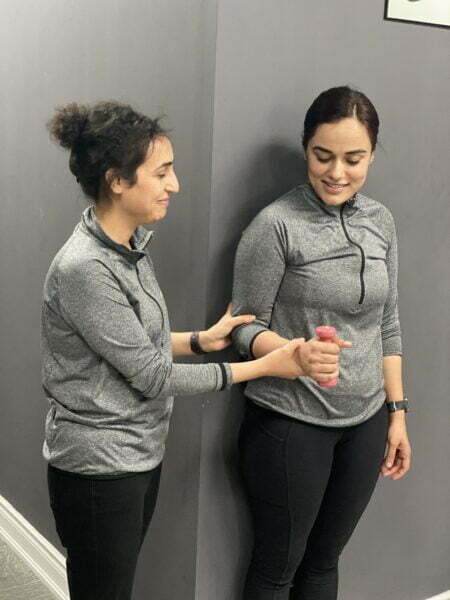
Types of Surgeries for Shoulder
- Reverse arthroplasty
- Total shoulder arthroplasty/replacement
- Rotator cuff repair
- SLAP repair
- Bicep tendon repair
- Tenotomy
What Prehab Programs look like:
Most prehab programs can be anywhere from 2-8 weeks leading up to surgery and could potentially involve:
1) Exercise training (2-3x/week)
- Strengthening and stabilization exercises for the rotator cuff and muscles supporting your shoulder blade
- Home exercise program tailored to your needs
- Exercise training 1 on 1 with a physical therapist
2) Education: information delivered regarding
- Shoulder anatomy and mechanics
- Pain science education
- The process of your operative procedure
- Patient-therapist expectations
- Post-operative protocol
- Detailed exercise program and technique
Also read, Best Physiotherapist near Mississauga
3) Nutritional support
- Consultation with a registered dietician
- Detailed nutrition programs to optimize physical and mental health
- Nutritional supplements as indicated
4) Psychological support
- Consultation with psychologist/ psychotherapist
- Anxiety and stress reduction
- Cognitive-behavioral therapy
- Relaxation techniques
- Coping strategies for surgery
Shoulder Prehab is a set of exercises and movements designed to strengthen and condition the shoulder joint and surrounding muscles, helping to prevent injury or improve recovery from a previous injury. Prehabilitation may include:
- Shoulder rotator cuff strengthening exercises such as internal and external rotation with light weights.
- Scapular stability exercises to improve posture and reduce stress on the shoulder joint.
- Stretching to improve flexibility and range of motion.
- Plyometric exercises to improve power and explosiveness.
- Core stability exercises to improve overall body control and stability.
Prehabilitation should be performed regularly, especially if you have a history of shoulder injuries or plan to participate in overhead activities such as weightlifting or throwing. By taking care of your shoulder before it becomes a problem, you can help prevent injury and improve your performance.
Click HERE to book an appointment with a physiotherapist at one of our eight locations.
- Physiotherapy Etobicoke – Triangle Physiotherapy Etobicoke
- Oakville Physiotherapy Clinic – Triangle Physiotherapy Oakville
- Physiotherapy North York – Triangle Physiotherapy North York
- Mississauga Physiotherapy Clinics – Triangle Physiotherapy Mississauga
- Downtown Physiotherapy Clinics – Triangle Physiotherapy King West
- Uptown Physiotherapy Clinics – Triangle Physiotherapy Lawrence Park
- Physiotherapy Clinic Downtown Toronto – Triangle Physiotherapy Queens Quay
- Physiotherapy Clinics Mississauga – Triangle Physiotherapy Erin Mills
Shoulder prehabilitation is essential for preventing injuries and optimizing recovery, especially for those undergoing surgery or managing shoulder pain. If you’re looking for professional physiotherapy services for shoulder prehabilitation, there are several clinics in physiotherapy Etobicoke, Oakville, North York, Toronto, Lawrence Park, Queens Quay, Erin Mills, Mississauga, and Liberty Village. These locations offer specialized care to help you strengthen your shoulders and maintain overall joint health.
Isn’t it so unfair?! Last night you were all fine before going to bed but the next morning you woke up with a sore shoulder. The uninvited shoulder pain makes you continuously look back and think of how you might have injured it. Maybe it was an intense dance lesson from last week, a strenuous workout, or even sleeping incorrectly. Not being able to figure it out, you carry on with your day, all the while noticing that something is feeling off.

Also read, Best Physiotherapy Clinic in Etobicoke
Below are a few common reasons that can cause “random” shoulder pain:
- Thoracic Spine Stiffness: The stiffness in the thoracic spine is mainly caused by lack of movement or prolonged sitting, which is more likely to happen since more people are having sedentary jobs. In such cases, we tend to round our shoulders more which eventually puts too much stress on underlying structures.
- Frozen Shoulder: A condition which causes a significant amount of scar tissue to be deposited all around the shoulder capsule, causing a noticeable range of motion restrictions, strength loss, and pain.
- Rotator Cuff Tendonitis: This usually occurs when the rotator cuff tendons in the shoulder are overworked or strained because of an injury. You might even hear a snapping sound when you move your shoulder. Exerting pressure on the shoulder, sleeping incorrectly, and poor shoulder mechanics are some of the causes of this condition.
- Shoulder Impingement: Sleeping on one arm can result in shoulder impingement. Shoulder impingement can also be caused due to excessive shoulder movements, ligament laxity, muscular weakness around the joint, poor posture, previous injury, etc.
- Scapular Dyskinesis: Also known as Chicken wing shoulder blades, this condition causes you to have poor muscular control of your shoulder blades. There can be muscle pain or joint pain around the scapula when carrying heavy objects.
- Referred Pain: Many people come to our physiotherapy clinics complaining about their shoulder pain, but after a thorough examination we realize that the pain is referred from their neck. It is important to see a Physiotherapist that understands this link and treats the right thing!
Also read, Physiotherapy Rehab Clinic in Oakville
How can I get relief from shoulder pain?
A few simple solutions which will give you some relief are:
- Avoid intense activities
- Maintain a proper posture
- Don’t sleep with your elbow over your head; this can compress the tendons of the shoulder and increase your pain
At Triangle Physiotherapy, will assess your shoulder and create a comprehensive treatment plan for you. Our treatment will involve a combination of hands-on manual therapy techniques as well as a custom exercise plan to help you on your road to recovery. Book your appointment now and stop letting your shoulder prevent you from doing the things you want to do!
Waking up with a sore shoulder can significantly affect your daily life, and physiotherapy can provide effective solutions to alleviate pain and improve mobility. If you’re looking for professional physiotherapy care, there are excellent clinics in physiotherapy Etobicoke, Oakville, North York, Toronto, Lawrence Park, Queens Quay, Erin Mills, Mississauga, and Liberty Village. These clinics offer specialized treatment plans to help you manage shoulder pain and enhance your overall well-being.

